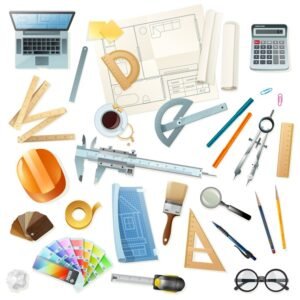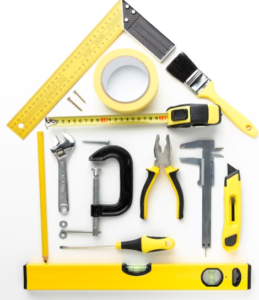Measuring tools are an essential part of any toolkit, whether you’re working on a big project or just tackling a small DIY task at home. From measuring distances to checking angles, these tools help you get the job done accurately. Understanding the different types of measuring tools available and how to use them correctly can make a huge difference in the outcome of your work.
Whether you’re a professional builder or a weekend DIYer, the right measuring tools can save you time and effort. In this guide, we’ll explore the most common measuring tools you should consider for your projects and how they can help you achieve perfect results every time. Let’s dive into the world of measuring tools and see what’s available for your next job.
What Are Estimating Instruments and Why Are They Significant?
Measuring tools are devices used to determine the size, length, width, height, or other physical dimensions of an object or space. They are important because they help ensure that your work is accurate and precise. Without these tools, tasks like building, crafting, or even cooking could become difficult and lead to mistakes.
Using measuring tools helps you avoid errors, saving both time and materials. For example, in construction, measuring tools ensure that walls are straight, and in tailoring, they make sure clothes fit perfectly. Accurate measurements can make the difference between a successful project and a failed one, which is why it’s essential to choose the right tools for the job.
Choosing the Best Measuring Tools for Your DIY Projects

When you’re working on DIY projects at home, it’s important to choose the right measuring tools to make your tasks easier and more accurate. Some tools, like tape measures and rulers, are great for smaller tasks. Other tools, like spirit levels and laser meters, are better for large projects, such as hanging shelves or building furniture.
For beginners, a basic set of measuring tools might include a tape measure, a ruler, and a spirit level. As you become more experienced, you might want to add more specialized tools, such as calipers or laser distance meters. Each tool is designed for different types of measurements, so choosing the right one depends on what you need to measure.
The Different Types of Measuring Tools You Need to Know About
There are many kinds of estimating devices, each intended for explicit undertakings. Here are some of the most common ones you should know about:
- Tape Measures: These are flexible tools used to measure length and distance. They’re ideal for tasks like measuring rooms or pieces of wood.
- Rulers and Yardsticks: These are rigid and perfect for measuring smaller distances, especially for drawing or cutting.
- Spirit Levels: These tools help you check if a surface is level or upright. They’re important in carpentry and construction.
- Laser Measures: These tools use laser technology to measure distances. They’re highly accurate and useful for large-scale projects.
Understanding which tool to use for each project will help you complete tasks more effectively and get better results.
How to Use Measuring Tools Accurately: A Step-by-Step Guide
Using measuring tools accurately can make your work much easier. The following are a couple of basic hints to assist you with obtain the best outcomes:
- Read the markings carefully: Whether you’re using a tape measure or a ruler, make sure you read the markings clearly. Misreading the scale can prompt slip-ups.
- Keep the tool steady: When using measuring tools like a spirit level, it’s important to keep the tool steady. Indeed, even slight developments can influence the exactness.
- Use the right tool for the job: Don’t use a tool that’s too small or too big for your project. This can cause measurement errors.
By following these simple steps, you can ensure your work is accurate and reliable every time.
Essential Measuring Tools for Home Improvement and Construction

When you’re doing home improvement or construction projects, having the right measuring tools can make all the difference. Here are a few fundamental devices you ought to constantly have close by:
- Tape Measure: A good-quality tape measure is necessary for measuring walls, furniture, and other large objects.
- Spirit Level: This tool is crucial for making sure surfaces are perfectly straight, whether you’re hanging pictures or installing shelves.
- Laser Measure: For precise long-distance measurements, a laser measure is ideal. It’s especially useful in large spaces like living rooms or outdoor areas.
- Caliper: If you need to measure the thickness or small details of an object, a caliper is the tool for the job.
Each of these tools will help you get accurate measurements, ensuring your project goes smoothly and looks professional.
Top 5 Measuring Tools Every Beginner Should Have
On the off chance that you’re simply beginning with Do-It-Yourself projects, you needn’t bother with a ton of extravagant instruments. Here are the top five measuring tools every beginner should have:
- Tape Measure: It’s the most basic tool you’ll need, perfect for measuring everything from furniture to home renovations.
- Ruler: A simple ruler will help with smaller tasks like cutting fabric or making crafts.
- Spirit Level: This tool ensures that things like shelves and pictures are hanging straight.
- Square: A square helps you measure and cut perfect right angles for projects like building boxes or frames.
- Utility Knife: While not a measuring tool, it’s useful for cutting materials to the right size.
These tools will set you up for success and help you tackle most basic DIY projects.
How to Care for Your Measuring Tools and Make Them Last Longer
Taking care of your measuring tools is important to ensure they remain accurate and durable. Here’s how to keep your tools in top shape:
- Store them properly: Avoid leaving your tools in damp or extreme conditions.Store them in a dry spot to forestall rust or harm.
- Clean regularly: Dirt and debris can affect the accuracy of your tools. Clean them after each utilization with a delicate material.
- Check for damage: Inspect your measuring tools regularly for any signs of wear and tear. A broken tape measure or a warped level won’t give you accurate results.
By keeping your tools in good condition, you’ll ensure they continue to work properly for years to come.
Conclusion
Measuring tools are essential for anyone who works on projects, whether you’re a beginner or an expert. They help ensure your work is accurate and makes everything easier, from building furniture to making art. Choosing the right tool for your task will save you time and help you avoid mistakes. Always remember to take care of your tools so they last longer and continue to give you the best results.
No matter what type of project you are working on, having the proper measuring tools makes a big difference. With the right tools, you can achieve more precise and professional-looking results. So, invest in good measuring tools, and watch your DIY projects improve!
FAQs
Q: What are measuring tools used for?
A: Measuring tools are used to check the size, length, width, or height of things. They help ensure your projects are accurate and fit perfectly.
Q: Do I need different measuring tools for different jobs?
A: Yes, different tasks require different tools. For example, a tape measure is great for large projects, while a ruler is perfect for smaller, precise measurements.
Q: How do I keep my measuring tools in good condition?
A: To keep measuring tools in good condition, store them in a dry place, clean them after use, and check for any damage regularly.
Q: What is the contrast between a measuring tape and a ruler?
A: A tape measure is flexible and can measure long distances, while a ruler is rigid and works better for smaller, precise measurements.
Q: Could I at any point utilize a laser measure rather than a measuring tape?
A: Yes, a laser measure is more accurate for longer distances and is faster than using a tape measure. It’s especially useful for large spaces.

